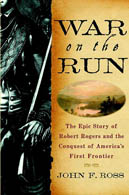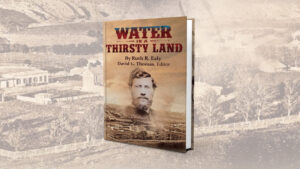
War on the Run
The Epic Story of Robert Rogers and the Conquest of America’s First Frontier
By John F. Ross, 548 pp.
Bantam Books, 2009
John Ross has brought to electrifying life Maj. Robert Rogers, a man who has been even more forgotten than the war he fought. Yet Rogers is remarkably relevant to the wars we are fighting today. American Special Forces units operating along the murderous border of Afghanistan and Pakistan owe thanks to him for their training and manuals. The irregulars who routed the Taliban in Afghanistan in 2001 were another set of Rogers’s unwitting disciples.
The son of impoverished Scots-Irish immigrants, Rogers grew to manhood in the harsh frontier of New Hampshire, where warfare between red men and white men was endemic. He was minimally educated and especially inept at handling his personal finances. As the French and Indian War was erupting in 1755, the 24-year-old Rogers was on trial for a dicey relationship with a counterfeiter named Sullivan. He escaped the hangman’s noose by rounding up more than 50 men and wangling a captain’s commission in a New Hampshire regiment.
Rogers soon volunteered to lead scouting expeditions that brought back valuable information about the location and strength of French forces and their Indian auxiliaries. Using the forest skills he had learned from Indians, he was also adept at devising ways the Americans and British could strike first. More than once he made his case by winning small but telling victories over enemy patrols.
On March 23, 1756, Governor William Shirley of Massachusetts, commander in chief of the British war effort in North America, authorized Rogers to create an independent company of “rangers” whose salaries would be paid directly by the Crown. His exploits over the next two years made Rogers a colonial hero.
Ross does an amazingly good job of bringing these forays, which Rogers often undertook in the bitter winter of northern New York, to life. He tells how Rogers taught his men to cope with almost insurmountable hardships and keep their heads in moments of terrible danger. He also introduced the latest weaponry into their tactics. In one encounter, rangers used swivel guns mounted in bateaux to wreak havoc on surprised French and Indians on Lake Champlain.
Soon Rogers was a major in command of a nine-company ranger regiment. To educate his men, he wrote “Rules of Ranging,”a carefully distilled set of 28 principles that he ordered every man to read and ponder. Perhaps the most important message was in the final paragraph, in which Rogers observed there was only one maxim that applied in all situations: “preserve a firmness and presence of mind on every occasion.”
Ross describes in vivid detail the climax of ranger exploits, the 1759 attack Rogers and his raiders made on the Arenac Indian town of St. François on the Richelieu River in Canada. He chose that town because its warriors had been raiding English settlements in New Hampshire and Massachusetts for a century, without any retaliation. By destroying that town, he sent a message that no one was safe from Robert Rogers and his men. In a gripping narrative, Ross describes how Rogers eluded a pursuing force of 200 French and Indian woodsmen and struck the village at dawn, killing and burning with no quarter asked or given.
Rogers retreat afterwards became a nightmare. The French had discovered the rangers’ boats and destroyed a cache of supplies they had left on the shore of Lake Champlain. Forced to make a long, overland slog to safety, dozens of his men starved to death. Others met even grislier fates at the hands of pursuing French and Indian war parties. Nevertheless, the St. François raid effectively dimmed the morale of the Canadians and their Indian allies, as well as sending the message that France could not protect them.
After Québec fell to a British army, the British commander sent Rogers west to receive the surrender of the remaining French and Indian forces, adding the whole gigantic swath of Canada to Britain’s empire. Rogers even prophesied Anglo-American destiny, calling for an expedition to find the Northwest Passage and inspire Englishmen to settle this huge wilderness. But small-minded bureaucrats in London were only interested in cutting the budget and wringing taxes out of recalcitrant Americans.
Without a war to fight, Rogers descended into deepening debt and drunkenness. When the American Revolution erupted, he was still a British officer on half pay. When he hesitated between the two sides, George Washington ordered his arrest. That drove him into the arms of the British, but a new generation of officers had no affection for him or the unmilitary ways of the motley group of fighters he recruited. Rogers drifted to England, where he died in poverty in 1795.
Ross does not flinch from telling this darker side of the story. But his superb narration of the feats of Rogers and his rangers while serving their fellow Colonials creates a reflected glow that makes Rogers’s later career seem a tragic coda.
—Thomas Fleming





